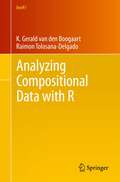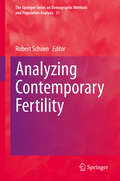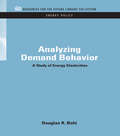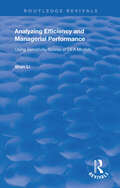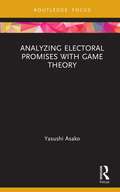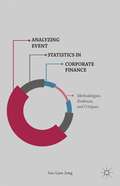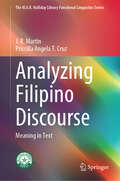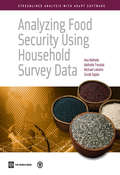- Table View
- List View
Analyzing Compositional Data with R (Use R!)
by K. Gerald van den Boogaart Raimon Tolosana-DelgadoThis book presents the statistical analysis of compositional data sets, i.e., data in percentages, proportions, concentrations, etc. The subject is covered from its grounding principles to the practical use in descriptive exploratory analysis, robust linear models and advanced multivariate statistical methods, including zeros and missing values, and paying special attention to data visualization and model display issues. Many illustrated examples and code chunks guide the reader into their modeling and interpretation. And, though the book primarily serves as a reference guide for the R package "compositions," it is also a general introductory text on Compositional Data Analysis. Awareness of their special characteristics spread in the Geosciences in the early sixties, but a strategy for properly dealing with them was not available until the works of Aitchison in the eighties. Since then, research has expanded our understanding of their theoretical principles and the potentials and limitations of their interpretation. This is the first comprehensive textbook addressing these issues, as well as their practical implications with regard to software. The book is intended for scientists interested in statistically analyzing their compositional data. The subject enjoys relatively broad awareness in the geosciences and environmental sciences, but the spectrum of recent applications also covers areas like medicine, official statistics, and economics. Readers should be familiar with basic univariate and multivariate statistics. Knowledge of R is recommended but not required, as the book is self-contained.
Analyzing Consumer Perceptions
by Robert J. DolanDescribes the perceptual mapping techniques in a non-technical fashion. The procedure is useful for the depiction of the structure of the market. Discusses alternative methods, presents examples of each, and shows how the maps can be used in marketing decision making.
Analyzing Consumer Preferences
by Robert J. DolanPresents a non-traditional description of the conjoint analysis methodology. Discusses the process by which a study is done and cites areas of application.
Analyzing Contemporary Fertility (The Springer Series on Demographic Methods and Population Analysis #51)
by Robert SchoenThis edited volume offers state-of-the-art research on the dynamics of contemporary fertility by examining the implications of the economic and social forces that are driving the rapid change in fertility behavior, and the changing context, determinants, and measurement of contemporary human reproduction. The volume explores new theoretical avenues that seek to incorporate uncertainty, examine social contagion effects, and explain the rise in childlessness. Reproductive attitudes are re-examined in chapters that deal with models of parenthood and with the persistence of race-ethnic-nativity differences. A new and important subject of multi-partner fertility is also described by examining it in the context of total fertility and from the usually neglected perspective of men. The impact of divorce on fertility, the measurement of childlessness and the postponement of first births, developments in assortative mating and fertility, and current patterns of interracial fertility are also addressed in this volume. By combining up-to-date research spanning the entire field to illuminate contemporary developments, the book is a valuable source for demographers, sociologists, economists, and all those interested in understanding fertility in today's world.
Analyzing Demand Behavior: A Study of Energy Elasticities (RFF Energy Policy Set)
by Douglas R. BohiFirst Published in 2011. Routledge is an imprint of Taylor & Francis, an informa company.
Analyzing Dependent Data with Vine Copulas: A Practical Guide With R (Lecture Notes in Statistics #222)
by Claudia CzadoThis textbook provides a step-by-step introduction to the class of vine copulas, their statistical inference and applications. It focuses on statistical estimation and selection methods for vine copulas in data applications. These flexible copula models can successfully accommodate any form of tail dependence and are vital to many applications in finance, insurance, hydrology, marketing, engineering, chemistry, aviation, climatology and health.The book explains the pair-copula construction principles underlying these statistical models and discusses how to perform model selection and inference. It also derives simulation algorithms and presents real-world examples to illustrate the methodological concepts. The book includes numerous exercises that facilitate and deepen readers’ understanding, and demonstrates how the R package VineCopula can be used to explore and build statistical dependence models from scratch. In closing, the book provides insights into recent developments and open research questions in vine copula based modeling.The book is intended for students as well as statisticians, data analysts and any other quantitatively oriented researchers who are new to the field of vine copulas. Accordingly, it provides the necessary background in multivariate statistics and copula theory for exploratory data tools, so that readers only need a basic grasp of statistics and probability.
Analyzing Determinants of Inflation When There Are Data Limitation: The Case of Sierra Leone
by Ken Miyajima Jan Gottschalk Kadima KalonjiA report from the International Monetary Fund.
Analyzing Digital Discourse: New Insights and Future Directions
by Pilar Garcés-Conejos Blitvich Patricia Bou-FranchThis innovative edited collection presents new insights into emerging debates around digital communication practices. It brings together research by leading international experts to examine methods and approaches, multimodality, face and identity, across five thematically organised sections. Its contributors revise current paradigms in view of past, present, and future research and analyse how users deploy the wealth of multimodal resources afforded by digital technologies to undertake tasks and to enact identity. In its concluding section it identifies the ideologies that underpin the construction of digital texts in the social world. This important contribution to digital discourse studies will have interdisciplinary appeal across the fields of linguistics, socio-linguistics, pragmatics, discourse analysis, gender studies, multimodality, media and communication studies.
Analyzing Digital Discourses: Between Convergence and Controversy
by Marjut Johansson Sanna-Kaisa Tanskanen Jan ChovanecThis book contributes to the scholarly debate on the forms and patterns of interaction and discourse in modern digital communication by probing some of the social functions that online communication has for its users. An array of experts and scholars in the field address a range of forms of social interaction and discourses expressed by users on social networks and in public media. Social functions are reflected through linguistic and discursive practices that are either those of ‘convergence’ or ‘controversy’ in terms of how the discourse participants handle interpersonal relations or how they construct meanings in discourses. In this sense, the book elaborates on some very central concerns in the area of digital discourse analysis that have been reported within the last decade from various methodological perspectives ranging from sociolinguistics and pragmatics to corpus linguistics. This edited collection will be of particular interest to scholars and students in the fields of digital discourse analysis, pragmatics, sociolinguistics, social media and communication, and media and cultural studies.
Analyzing Digital Fiction: Analyzing Digital Fiction (Routledge Studies in Rhetoric and Stylistics)
by Astrid Ensslin Alice Bell Hans Kristian RustadWritten for and read on a computer screen, digital fiction pursues its verbal, discursive and conceptual complexity through the digital medium. It is fiction whose structure, form and meaning are dictated by the digital context in which it is produced and requires analytical approaches that are sensitive to its status as a digital artifact. Analyzing Digital Fiction offers a collection of pioneering analyses based on replicable methodological frameworks. Chapters include analyses of hypertext fiction, Flash fiction, Twitter fiction and videogames with approaches taken from narratology, stylistics, semiotics and ludology. Essays propose ways in which digital environments can expand, challenge and test the limits of literary theories which have, until recently, predominantly been based on models and analyses of print texts.
Analyzing Education, Sustainability, and Innovation: Multidisciplinary Research Perspectives (SpringerBriefs in Applied Sciences and Technology)
by Andreas Öchsner Azman Ismail Mohd Amran Mohd Daril Fatin Nur Zulkipli Rahimah MahatThis book describes a diverse array of studies unravelling the intricate interplay of education, sustainability, and organizational dynamics. From innovative teaching methodologies to sustainability trends and the pandemic's impact, this compendium offers a rich tapestry of insights. This book traverses through a compendium of studies that intricately dissect the synergy between education, sustainability, and organizational dynamics. This book is ideal for academics, practitioners, and curious minds seeking a deeper understanding of these vital contemporary forces.
Analyzing Efficiency & Managerial Performance: Using Sensitivity Scores of DEA Models
by Shan LiThis study was initially the author’s Ph.D dissertation written at the University of Texas at Austin in 1995 entitled “A New Approach to Sensitivity Analysis of the DEA Models and their Applications to Ranking and Productivity Growth.” An updated preface and a general index were added for this book which was originally published in 1996. The primary objective of this study is to demonstrate a new method available to management scientists for evaluating the organizational efficiency performance and analyzing how stable the evaluations are to the sample data collections.
Analyzing Electoral Promises with Game Theory (Routledge Focus on Economics and Finance)
by Yasushi AsakoElectoral promises help to win votes and political candidates, or parties should strategically choose what they can deliver to win an election. Past game-theoretical studies tend to ignore electoral promises and this book sheds illuminating light on the functions and effects of electoral promises on policies or electoral outcomes through game theory models. This book provides a basic framework for game-theoretical analysis of electoral promises. The book also includes cases to illustrate real life applications of these theories.
Analyzing Emotion in Spontaneous Speech
by Sunil Kumar Kopparapu Rupayan Chakraborty Meghna PandharipandeThis book captures the current challenges in automatic recognition of emotion in spontaneous speech and makes an effort to explain, elaborate, and propose possible solutions. Intelligent human-computer interaction (iHCI) systems thrive on several technologies like automatic speech recognition (ASR); speaker identification; language identification; image and video recognition; affect/mood/emotion analysis; and recognition, to name a few. Given the importance of spontaneity in any human-machine conversational speech, reliable recognition of emotion from naturally spoken spontaneous speech is crucial. While emotions, when explicitly demonstrated by an actor, are easy for a machine to recognize, the same is not true in the case of day-to-day, naturally spoken spontaneous speech. The book explores several reasons behind this, but one of the main reasons for this is that people, especially non-actors, do not explicitly demonstrate their emotion when they speak, thus making it difficult for machines to distinguish one emotion from another that is embedded in their spoken speech. This short book, based on some of authors' previously published books, in the area of audio emotion analysis, identifies the practical challenges in analysing emotions in spontaneous speech and puts forward several possible solutions that can assist in robustly determining the emotions expressed in spontaneous speech.
Analyzing English Grammar
by Thomas P. Klammer Muriel R. Schulz Angela Della VolpeWhile drawing upon traditional, structural and transformational grammatical theory, the primary purpose of this book is to provide sound pedagogical grammar instruction. Taking an eclectic approach, this effective learning tool is designed to support and assist learning about the structure of English. Unlike similar books, Analyzing English Grammar directly addresses its audience with understandable language and clear explanations. From cover to cover, it models the techniques of step-by-step linguistic analysis that the authors teach in their own classes. Numerous exercises help readers move from mastering clear, prototypical cases toward critical analysis of the more complex and borderline fuzzy grammar examples that characterize actual language. Includes the conventions of Standard English in a context of regional, social, and stylistic variation. Grammatical concepts are applied to practical writing problems.
Analyzing Ethics Questions from Behavior Analysts: A Student Workbook
by Jon S. Bailey Mary R. BurchSupplementing the best-selling textbook, Ethics for Behavior Analysts, this book analyzes over 50 original and up-to-date ethics cases recently faced by behavior analysts. The workbook provides "solutions" to each question written by the most expert professionals in the field using the Behavior Analyst Certification Board® Ethics Code. Covering all ten sections of the code and designed to allow the reader to see the original question, respond given their knowledge of the Code, and then compare their answers with the authors’ answers at the back of the book, Jon S. Bailey and Mary R. Burch provide the necessary guided practice for both students and clinicians to improve ethical competency in behavior analysis.
Analyzing Ethics Questions from Behavior Analysts: A Student Workbook
by Jon S. Bailey Mary R. BurchSupplementing the best-selling textbook, Ethics for Behavior Analysts, this workbook analyzes over 100 original and up-to-date ethics questions posed by behavior analysts, to the highly regarded ABA Ethics Hotline.This new edition provides solutions to each question using the 2020 Behavior Analyst Certification Board® Ethics Code. Covering all six sections of the new code, it is designed to allow the reader to see the original question, our response, and then compare their answers with the Hotline expert’s answers at the back of the book. Bailey and Burch provide the necessary guided practice for both students and clinicians to improve ethical problem solving and competency in behavior analysis.This book is an invaluable resource for all budding behavior analysts and their teachers.
Analyzing Event Statistics In Corporate Finance
by Jau-Lian JengAnalyzing Event Statistics in Corporate Finance provides new alternative methodologies to increase accuracy when performing statistical tests for event studies within corporate finance. In contrast to conventional surveys or literature reviews, Jeng focuses on various methodological defects or deficiencies that lead to inaccurate empirical results, which ultimately produce bad corporate policies. This work discusses the issues of data collection and structure, the recursive smoothing for systematic components in excess returns, the choices of event windows, different time horizons for the events, and the consequences of applications of different methodologies. In providing improvement for event studies in corporate finance, and based on the fact that changes in parameters for financial time series are common knowledge, a new alternative methodology is developed to extend the conventionalanalysis to more robust arguments.
Analyzing Evolutionary Algorithms: The Computer Science Perspective (Natural Computing Series)
by Thomas JansenEvolutionary algorithms is a class of randomized heuristics inspired by natural evolution. They are applied in many different contexts, in particular in optimization, and analysis of such algorithms has seen tremendous advances in recent years. In this book the author provides an introduction to the methods used to analyze evolutionary algorithms and other randomized search heuristics. He starts with an algorithmic and modular perspective and gives guidelines for the design of evolutionary algorithms. He then places the approach in the broader research context with a chapter on theoretical perspectives. By adopting a complexity-theoretical perspective, he derives general limitations for black-box optimization, yielding lower bounds on the performance of evolutionary algorithms, and then develops general methods for deriving upper and lower bounds step by step. This main part is followed by a chapter covering practical applications of these methods. The notational and mathematical basics are covered in an appendix, the results presented are derived in detail, and each chapter ends with detailed comments and pointers to further reading. So the book is a useful reference for both graduate students and researchers engaged with the theoretical analysis of such algorithms.
Analyzing Filipino Discourse: Meaning in Text (The M.A.K. Halliday Library Functional Linguistics Series)
by J. R. Martin Priscilla Angela CruzThis book explores Filipino, the national language of the Philippines, from the perspectives of Critical Discourse Analysis (CDA) and Positive Discourse Analysis (PDA)—informed by Systemic Functional Linguistics (SFL). It is designed to encourage researchers to study Filipino texts—both spoken and written—and to unpack them in a way that clarifies their function in Philippine society. With this goal in mind, the book introduces a number of discourse analysis tools and shows how to apply them to a range of Filipino texts—including a children's picture book story, some mental health advice about coping with COVID-19, President Duterte's speech about the Philippine government's initial response to the COVID-19 pandemic, a comment piece from a student newspaper about problems with online learning modules produced by the Department of Education, and a reflective text about growing up in Davao. This is the first book to draw on a range of functional linguistic tools to analyse Filipino discourse in order to provide deeper insights into the role of language in bilingual education, the linguistic enactment of power, and the importance of thinking across languages when analysing texts. Key issues addressed include the complementarity of CDA and PDA, SFL's model of social context (as register and genre), analysing bilingual texts and bilingual education. The book fosters appliable linguistics as a dialectic of theory, description, and practice—supporting Filipino discourse analysts as they engage with the challenge of giving people access to a range of tools they can use productively to mean and thereby more successfully pursue their social goals. As such, it provides a model for researchers of other languages of how to encourage the analysis of meaning in texts within and beyond the clause. It is relevant to scholars across the spectrum of linguistics, particularly those working in Systemic Functional Linguistics.
Analyzing Financial Data and Implementing Financial Models Using R (Springer Texts in Business and Economics)
by Clifford S. AngThis book is a comprehensive introduction to financial modeling that teaches advanced undergraduate and graduate students in finance and economics how to use R to analyze financial data and implement financial models. This text will show students how to obtain publicly available data, manipulate such data, implement the models, and generate typical output expected for a particular analysis. This text aims to overcome several common obstacles in teaching financial modeling. First, most texts do not provide students with enough information to allow them to implement models from start to finish. In this book, we walk through each step in relatively more detail and show intermediate R output to help students make sure they are implementing the analyses correctly. Second, most books deal with sanitized or clean data that have been organized to suit a particular analysis. Consequently, many students do not know how to deal with real-world data or know how to apply simple data manipulation techniques to get the real-world data into a usable form. This book will expose students to the notion of data checking and make them aware of problems that exist when using real-world data. Third, most classes or texts use expensive commercial software or toolboxes. In this text, we use R to analyze financial data and implement models. R and the accompanying packages used in the text are freely available; therefore, any code or models we implement do not require any additional expenditure on the part of the student. Demonstrating rigorous techniques applied to real-world data, this text covers a wide spectrum of timely and practical issues in financial modeling, including return and risk measurement, portfolio management, options pricing, and fixed income analysis.
Analyzing Financial Data and Implementing Financial Models Using R (Springer Texts in Business and Economics)
by Clifford S. AngThis advanced undergraduate/graduate textbook teaches students in finance and economics how to use R to analyse financial data and implement financial models. It demonstrates how to take publically available data and manipulate, implement models and generate outputs typical for particular analyses. A wide spectrum of timely and practical issues in financial modelling are covered including return and risk measurement, portfolio management, option pricing and fixed income analysis. This new edition updates and expands upon the existing material providing updated examples and new chapters on equities, simulation and trading strategies, including machine learnings techniques. Select data sets are available online.
Analyzing Fiscal Space Using the MAMS Model: An Application to Burkina Faso
by Jan Gottschalk Vu Manh Le Hans Lofgren Kofi NouveA report from the International Monetary Fund.
Analyzing Food Security Using Household Survey Data
by Zurab Sajaia Michael Lokshin Nathalie Troubat Ana MoltedoSince the end of the Second World War, the international community has been focusing on reducing the number and the proportion of people who suffer from hunger. Over time it became clear that no single indicator would provide a comprehensive picture of the food security situation. Rather, a suite of indicators is necessary to describe food insecurity in all its dimensions. The demand for evidence-based policies, which brings together providers such as statistical offices and users of food security indicators including policy makers and researchers, has also been increasing. The stand-alone software, ADePT-Food Security Module (available for free downloading), was developed to produce food security indicators from food consumption data collected in household surveys. These indicators, derived at the national and subnational levels, include the consumption of calories and macronutrients, the availability of micronutrients and amino acids, the distribution of calories and the proportion of people undernourished. The book focuses on the theory, methodology, and analysis of these indicators. It has five chapters beginning with a brief overview on concepts of food security. The theory and methodology are further described in the following chapter. To help users with the interpretation of the results some examples are given in chapter 3. Chapter 4 of the book provides guidelines for the preparation of the input datasets. Finally, chapter 5 explains how to use the software. Both the software and this book are products of decades of experience in analyzing food security. This project was made possible through collaboration between FAO and the World Bank, with financial support from the European Union.
Analyzing Food for Nutrition Labeling and Hazardous Contaminants
by Ike J. Jeon William G. IkinsThis work provides up-to-date information on the various analytical procedures involved in both nutrition labelling and the identification and quantitation of hazardous chemicals in foods. It assesses the relative strengths of traditional and modern analysis techniques. The book covers all mandatory dietary components and many optional nutritients specified by the new labelling regulations of the Food and Drug Administration and the US Department of Agriculture Food Safety and Inspection Service.
